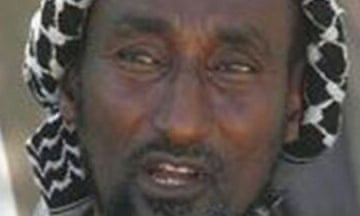The alleged mastermind of the terrorist attack in Garissa that left 147 people dead is a Kenyan national, illustrating how national boundaries have become blurred in the country’s war with Somalia-based Islamist militant group al-Shabaab.
Mohamed Mohamud aka Dulyadeyn, believed to be a close friend of al-Shabaab’s leader, Ahmed Omar Abu Ubeyd, is now the subject of a bounty of 20m shillings (£145,000) for his suspected role in organising the attack.
He has several aliases, including Gamadhere, Kuno and Abdurahman, according to a Somali security source, and is thought to be responsible for leading al-Shabaab’s operations in Kenya. Dulyadeyn, who is in his mid-40s and has three wives, was linked to the audacious attack on the Westgate shopping mall in Nairobi and was recently accused of orchestrating 12 militants in a plot against the Kenyan parliament.
His career began conventionally enough as an engineer who earned a degree from Jomo Kenyatta University in Nairobi in the early 1990s. He worked for the Saudi-based al-Haramain Islamic Foundation, according to Kenya’s Star newspaper, and was then a teacher and principal of a madrasa, or Islamic school, in Garissa.
But he became increasingly radicalised and crossed the border into Somalia, joining the Islamic Courts Union. After that movement collapsed, he held a variety of positions in al-Shabaab. He is alleged to have been behind several attacks on Kenyan troops who are fighting the militant group in the Jubaland region.
Two of his wives reportedly live in Garissa while a third is near Ras Kamboni, a town in Jubaland. The Star added: “His mother is Ralia Mohamed Wardere, alias the Iron Lady. His siblings include Abdi Yussuf Ali Adan, alias Abdi Mulla, an al-Shabaab leader who accidentally shot himself with his own pistol while demonstrating safety precaution techniques to new recruits in Kismayu. He survived the accident.”
Dulyadeyn is rumoured to have built a large network of al-Shabaab sympathisers and operatives in his home country, especially in Dadaab, the world’s biggest refugee camp. A heavy-handed approach by Kenyan security forces in places such as Garissa is said to fuel anger and alienation that makes it easier for al-Shabaab to find recruits. Peter Aling’o, a senior researcher at the Institute of Security Studies in Nairobi, said: “Kenya should also look at this as an internal problem.”
Dulyadeyn is also understood to have been a key aide for former al-Shabaab leader Ahmed Abdi Godane in carrying out the 2013 Westgate mall attack in Nairobi, earning Godane’s praise. Sources say that Dulyadeyn, who speaks Kiswahili and English fluently, was able to cross from Somalia to Kenya and was there during the four-day siege.
A 2m Kenyan shilling (£14,500) reward was placed on Dulyadeyn’s head for his alleged involvement in other attacks on Kenyan soil, including one last November on a bus near the town of Mandera that saw 28 teachers, civil servants and others murdered. The dead are reported to have failed to recite Koranic verses.
A Kenyan official said: “He commands the militia along the border and is responsible for cross-border incursions in the country. In the recent past, he has intensified attacks in northern Kenya and the coast region, particularly Garissa, Mandera and Lamu.”
